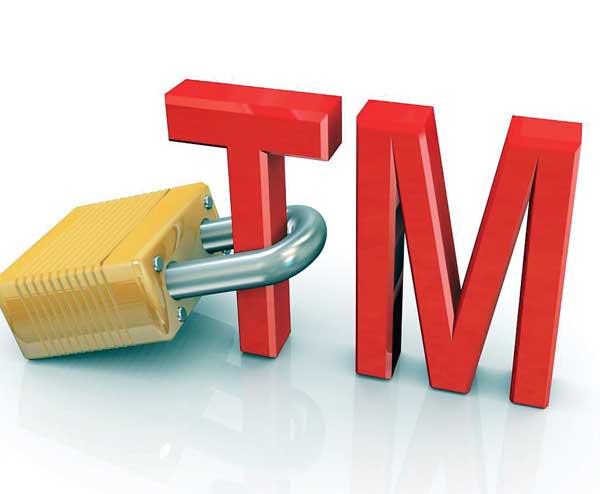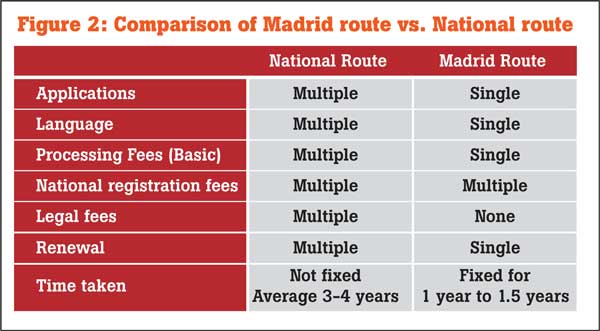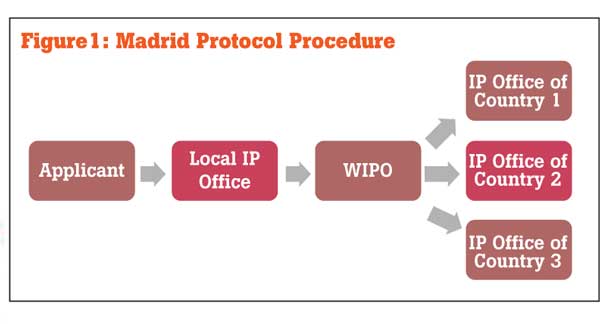24 Nov 2016 - {{hitsCtrl.values.hits}}

Guest Article by Verité Research
The Sri Lankan exporters have long highlighted the importance of Sri Lanka acceding to the Madrid Protocol (the global system for registering trademarks (TMs) abroad). Madrid will help reduce the time, hassle and cost incurred by companies when registering TMs abroad. This will help facilitate Sri Lankan exporters’ efforts to sell products under their own TMs abroad. In the last budget, the government at last agreed and allocated Rs.100 million to speed up accession.
The agency responsible for implementing the proposal is the National Intellectual Property Office (NIPO) of Sri Lanka. It has been a year since the proposal was made but the private sector stakeholders are not aware of the status of accession. Further, research shows accession to Madrid to be only one step in the right direction. To facilitate registering of TMs both locally and internationally, the country needs to go beyond mere Madrid compliance.
Why register TMs?
TMs help businesses distinguish their products/services from those of their competitors. They embody the brand image of companies. Carefully developed and nurtured TMs can be worth more than the physical assets of a company. Therefore, protection of TMs is important, especially for companies that plan to gain a competitive advantage through branding both in the domestic and international markets. Failure to do so at the early stages of brand creation can cost a company millions later. To protect the TM or to prevent any other company from selling products under the TM owned by a company, it must register the TM with the intellectual property (IP) offices in that country.

Cumbersome and costly process
Consultations with private sector stakeholders reveal that registering TMs is a cumbersome, lengthy and costly process both locally and internationally. The time taken to register a trademark both in Sri Lanka and abroad can take more than three years. The need to go through an attorney adds to the cost. Exporters must file separate applications with the IP offices in each country and the process is extremely cumbersome. It entails handling multiple applications, in multiple languages, in multiple countries through multiple lawyers.
Madrid saves time and cost
The Madrid Protocol (administered by the World Intellectual Property Office (WIPO)) is a centralized and simplified global system for registering and maintaining TMs abroad. The process of registering TMs through Madrid is shown in Figure 1.
Madrid helps reduce the time, hassle and cost of registering TMs abroad (Figure 2). The TM application is processed within a one to one and half-year period. It enables registering in multiple countries by submitting a single application to the WIPO without having to go through any lawyers. Calculations made by the International Trademark Association of the United States as far back as in 2003 show that the cost to register a trademark in the USA and 10 other countries through individual IP offices amounts to US $ 14,600, as opposed to US $ 5,800 under Madrid.
To accede to the Madrid, the NIPO must be prepared to process non-resident trademark applications that come through the WIPO within a maximum of one and half years. In return, the 113 Madrid member countries also agree to process Sri Lankan TM applications within one to one and half years.

Benefits of accession: Sri Lankan perspective
Madrid will have an immediate positive impact on Sri Lankan TM owners already registered with the NIPO, who are either selling or planning to sell under their TMs abroad. However, any incremental gains the country expects through accession in terms of increased demand for international TM registration depends on the support structures within the country that encourage TM registration and brand creation.
For example, Madrid compliance does not have any direct bearing on the time taken to process resident TM applications. In this respect, the glaring gap between the number of resident TMs registered compared to the applications in Sri Lanka and the cumbersome and lengthy process of registering resident TMs, is a concern. On average, during the last decade, out of 4540 TM applications the NIPO received a year by residents, only 755 TMs got registered. As a percentage of applications, registrations amount to 17 percent a year.
In contrast, the IP office of Philippines (a Madrid member) on average received 12,949 resident TM applications a year and registered 8320 TMs. As a percentage of applications, registrations averaged 64 percent a year. Thus, it is important to analyse the reasons for the low number of registrations in Sri Lanka and take steps to reduce the gap. The successful local TMs and brands have a greater probability of succeeding in foreign markets.
Way forward
Mere Madrid compliance (i.e. processing non-resident applications in one and half years) is not the objective of accession. The objective is to increase the number of Sri Lankan TMs registered abroad by using the simplified and centralised Madrid system. Hence, in drafting the road map of accession, the scope must go beyond being merely Madrid compliant. It must take into consideration ways and means of promoting and facilitating both local and international TM registration by Sri Lankan business. For example, having provisions to simplify and expedite the resident TM registration, reduce the gap between applications and registrations and establish support structures to encourage branding products abroad is important. Further, inputs from Sri Lankan businesses, exporters and export promotion agencies are critical to meet the objective of accessing the Madrid.
(This guest article for TIPS is by Verité Research, a private think tank that provides strategic analysis for Asia. Its main research and advisory divisions are in economics, politics, law and media. TIPS (Trade Intelligence for the Private Sector) is a Ceylon Chamber of Commerce initiative to enhance awareness on trade policy issues among the business community)
25 Nov 2024 2 hours ago
25 Nov 2024 3 hours ago
25 Nov 2024 3 hours ago
25 Nov 2024 5 hours ago
25 Nov 2024 5 hours ago